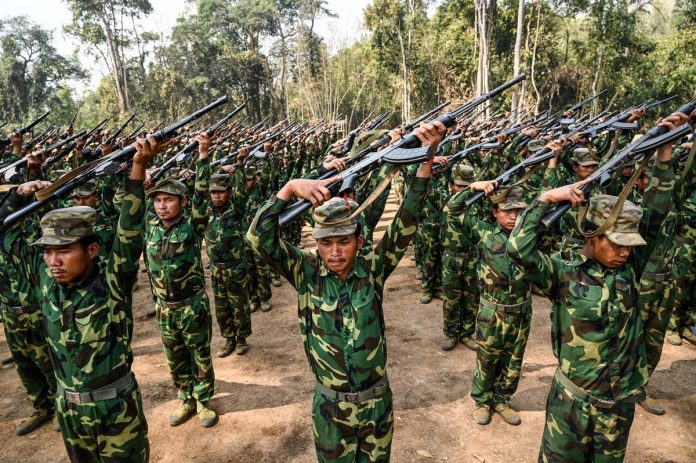As conflict continues to escalate in Myanmar’s Rakhine State, the Rohingya minority find themselves ensnared in a perilous predicament, facing threats from both the military junta and armed opposition groups. The Rohingya, a long-oppressed Muslim minority in the predominantly Buddhist country, have endured decades of persecution and discrimination, marked by the stripping of their citizenship and confinement to displacement camps and segregated villages.
The recent escalation of violence traces back to last November when the Arakan Army, an armed opposition group advocating for autonomy for the Arakanese people, broke an informal ceasefire by launching attacks on junta outposts across Rakhine State. This breach sparked a series of events resulting in the surrender of several townships to the Arakan Army and other armed groups forming the Three Brotherhood Alliance. Hundreds of junta soldiers have surrendered or fled, prompting the military to resort to conscription as a means to bolster its ranks.
However, the conscription program, slated to commence next month, has sent shockwaves through the Rohingya community as it includes mandatory military service for men aged 18-35 and women aged 18-27, under the threat of a five-year prison term for refusal. This inclusion of the Rohingya, despite their long-standing statelessness and marginalization, has sparked defiance and resistance within the community.
“I was approached, but I didn’t agree because the military has never done anything positive for the Rohingya,” revealed a 25-year-old Rohingya resident of a displacement camp in Rakhine’s Sittwe Township, who chose to remain anonymous for fear of reprisals. “They have oppressed us throughout history, and it has been a decade that they’ve detained us, like in this internment camp.”
Reports have surfaced indicating that approximately 100 Rohingya have already been arrested for refusing conscription, shedding light on the challenges faced by those who dare to defy military orders. With borders heavily policed and conflict intensifying across Myanmar, evading the draft has become a daunting task for many Rohingya. In areas under junta control, young men scarcely venture outside, fearing recruitment, while others contemplate fleeing the country altogether.
Further exacerbating the plight of the Rohingya are indiscriminate aerial raids conducted by the junta, which have resulted in civilian casualties. On March 18, 2024, airstrikes targeted the village of Thada, claiming the lives of at least 25 Rohingya individuals and leaving another 25 wounded. This tragic incident underscores the vulnerability of Rohingya civilians who find themselves caught in the crossfire between warring factions.
As Myanmar’s conflict continues to escalate, the Rohingya find themselves trapped in the midst of a bloody struggle for power, their lives hanging in the balance as they navigate the treacherous terrain of political turmoil and violence. Their plight serves as a grim reminder of the urgent need for international attention and intervention to address the systemic oppression and violence endured by minority communities in Myanmar.
Recent reports emerging from Myanmar’s Rakhine state have heightened international alarm as ongoing military airstrikes allegedly led to the deaths of more than 20 civilians. The United Nations Secretary-General, Antonio Guterres, has expressed grave concern over the situation, particularly condemning a recent attack in Minbya township, which reportedly resulted in significant civilian casualties.
Tensions in Rakhine have been escalating since November, when the Arakan Army launched a series of attacks on security forces, effectively ending a fragile ceasefire established after the military coup in 2021. This escalation has led to intensified conflict in the region, with Rakhine state bearing the brunt of the violence.
Minbya township, located east of the state capital Sittwe, has become a hotspot for clashes, with residents recounting devastating airstrikes targeting civilian areas. One resident, speaking anonymously, described a bombing in the village of Thar Dar early Monday morning, claiming the lives of men, women, and children. Another resident corroborated the account, highlighting the indiscriminate nature of the attack.
The recent violence has worsened an already dire humanitarian situation in Rakhine, with tens of thousands displaced by the conflict. This exacerbates the ongoing crisis in the region following the 2017 military crackdown, which forced hundreds of thousands of Rohingya Muslims to flee to neighboring Bangladesh.
Communication with affected areas has been severely disrupted by mobile network outages, making it difficult to assess the full extent of the crisis. While the military retains control of Sittwe, the Arakan Army has made significant territorial gains in surrounding districts, raising concerns of further escalation and regional instability.
The conflict has also spilled over into neighboring countries, with recent clashes along the Myanmar-Bangladesh border resulting in casualties on both sides. The Arakan Army is one of several armed ethnic minority groups operating in Myanmar’s border regions, each with their own grievances dating back to the country’s independence from British colonial rule. These groups often clash with the military over control of valuable resources and political autonomy. International pressure is mounting for a peaceful resolution to the escalating violence in Rakhine, with calls for all parties involved to prioritize the protection of civilian lives and uphold human rights standards.




